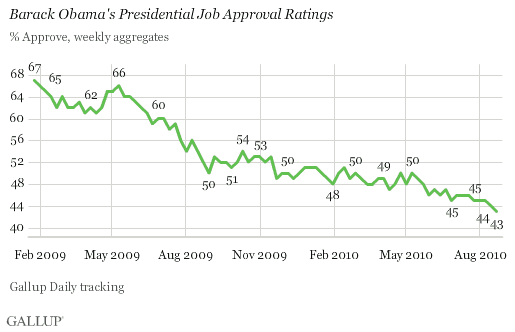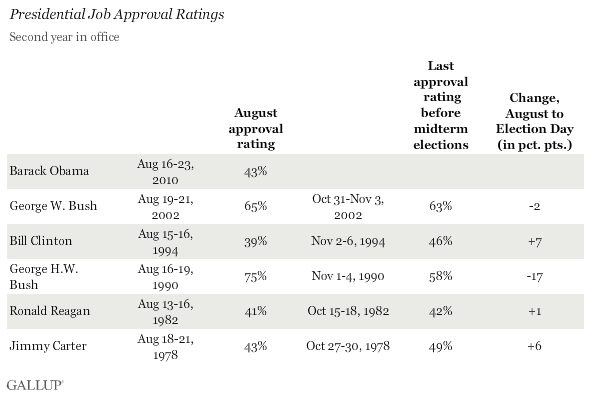PRINCETON, NJ -- President Obama's job approval rating slipped to 43% for the week of Aug. 16-22, down one percentage point from the previous weekly low set a week ago.

The new low also marks the first weekly average in which 50% of Americans disapprove of Obama's job performance. The erosion reflects particularly low ratings at the beginning of last week, including 41% for Aug. 15-17 and Aug. 16-18, the lowest three-day averages of his administration. By the end of the week, however, Obama's job ratings inched up, averaging 44% approval Aug. 20-22.
The president arrived at Martha's Vineyard, Mass., on Thursday, settling in with his family for a 10-day vacation, and for the most part dropping out of the daily news cycle. Whether this contributed to his slightly better ratings near the end of the week cannot be determined.
Obama's current 43% rating is well below the job approval ratings for both Presidents Bush at this point in their second year in office, but at roughly the same level as Presidents Clinton, Reagan, and Carter. None of the three presidents who were in the 40% range in August of their second year got back to 50% by the time of the midterm elections.

Although there is nothing official about a 50% job approval rating in midterm election years, history shows that when presidents are at that level or higher, their party loses fewer congressional seats than it does when their approval ratings are below 50%.
Looking beyond the midterm elections, one of the two presidents with the highest August second-year ratings (George H.W. Bush) was defeated in his bid for re-election to a second term, while two of the three presidents with low ratings in August of their second year (Clinton and Reagan) were re-elected handily.
Explore Obama's approval ratings in-depth and compare them with those of past presidents in the Gallup Presidential Job Approval Center.
Results are based on telephone interviews conducted as part of Gallup Daily tracking survey Aug. 16-22, 2010, with a random sample of 3,571 adults, aged 18 and older, living in all 50 U.S. states and the District of Columbia, selected using random-digit-dial sampling.
For results based on the total sample of national adults, one can say with 95% confidence that the maximum margin of sampling error is ±2 percentage points.
Interviews are conducted with respondents on landline telephones and cellular phones, with interviews conducted in Spanish for respondents who are primarily Spanish-speaking. Each daily sample includes a minimum quota of 150 cell phone respondents and 850 landline respondents, with additional minimum quotas among landline respondents for gender within region. Landline respondents are chosen at random within each household on the basis of which member had the most recent birthday.
Samples are weighted by gender, age, race, Hispanic ethnicity, education, region, adults in the household, cell phone-only status, cell phone-mostly status, and phone lines. Demographic weighting targets are based on the March 2009 Current Population Survey figures for the aged 18 and older non-institutionalized population living in U.S. telephone households. All reported margins of sampling error include the computed design effects for weighting and sample design.
In addition to sampling error, question wording and practical difficulties in conducting surveys can introduce error or bias into the findings of public opinion polls.
For more details on Gallup's polling methodology, visit https://www.gallup.com/.
